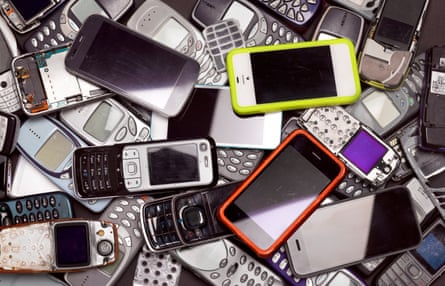by asetos
Share
by asetos
Share

How does it feel to live without a smartphone? ‘Almost spiritual’
For most, giving up a smartphone in 2023 would be an almost inconceivable inconvenience. But those who’ve done it say they found delight with dumber devices
Earlier this year, Angelo Profera’s smartphone gave up the ghost. Like many 21-year-olds, he’d been using it a lot: messaging friends, scrolling social media and taking care of personal admin. But he’d also started feeling like the phone was more chore than convenience. “I felt a lot of pressure to be connected,” he says. “I didn’t like how much energy I was putting into answering voice messages and being available all the time.”
Browsing for a replacement phone, he had a brainwave. He left the shop with a phone that had no internet and could only receive calls and text messages: a dumb phone. It was a bold move for a smartphone native, and Profera, who lives in Switzerland, was initially worried his new device might cause some problems. Instead, he says, it has transformed the way he interacts with the world.
He now calls people when he wants to speak to them, rather than having drawn out chats on WhatsApp, which has improved the quality of his relationships. And he feels more confident and productive, including in his work as an engineer. “With calling people much more regularly, I felt more comfortable speaking to businesses and getting things done.”

Without the distraction of a smartphone he feels freer, describing the experience as “almost spiritual”.
Profera is not alone: although smartphone sales globally continue to rise, an increasing number of people are trading in their smartphones for simpler, more basic models. HMD Global, owner of Nokia, recently reported that the market for limited-feature flip phones is up 5% in the US and rising in Europe, while reports suggest sales in Australia have doubled in the past year. Nokia has even embraced the ‘dumb phone’ moniker.
The first iPhone was released in 2007, and just one year later the UK Post Office coined the term ‘nomophobia’ to describe the fear of going without a mobile. Now, smartphone usage is almost ubiquitous in wealthy countries. UK mobile users spent an average of 4 hours and 14 minutes a day on their phones in 2022, while in Australia it was closer to 5 hours.
We’re regularly warned of the effects that too much screen time can have on our sleep, relationships and mental health. Frequent, too, are studies showing rising rates of smartphone addiction.
Ru Litherland, 49, has passively observed the rise in smartphone usage over the past 16 years. The London-based market gardener finds it difficult to understand how people have become so attached. “There’s an uncritical embracing of it,” he says.
“Technology should be there to serve us, but so often technologies are created to make profit … I approach it from the perspective of: how useful is this, and what do we lose from it? So often where there’s a gain from technology, there’s a loss too.
Though Litherland recognises the practical side of smartphones, he thinks they can take people away from appreciating the world around them. Though the alternative might involve a long queue at the bank; time spent waiting on hold to a call centre, or communicating via letter, Litherland sees these tasks as opportunities for more meaningful social interactions.
Dr Zeena Feldman, a senior lecturer in digital communications at King’s College London, says smartphone refusers typically fall into three groups: the older generation who have never really used them; middle-aged people who have chosen to give up their phones because of privacy concerns, and younger people who “have realised the toxicity of this dependency we have on our little pocket computers”.
Feldman says gen Z advocates tend to be middle class and fairly privileged – typified by the New York City ‘Luddite Club’.
Temporary or permanent smartphone blackouts have also received celebrity endorsements: Michael Cera, Selena Gomez and Aziz Ansari are all converts.
F
or those who have already used smartphones, switching back to life without one can prove difficult too. Catherine Webb, 45, has tried several times, using a dumb phone for months at a time. She says she finds it “freeing”.
“In spare moments you can just think, rather than pick up the phone and find out that the world is ending, or that you have a worrying work email, or that someone on the internet is annoyed by an inconsequential thing.”

Although she would like to use a dumb phone permanently, the pandemic-accelerated rise of QR codes, for everything from restaurant menus to mobile ticketing, has made it too impractical.
In an increasingly connected world, Feldman says that giving up your smartphone is often a privilege only afforded to those who don’t rely on one for work. Unlike Cera, Ansari and Gomez, most people do not have agents or assistants to scroll for them. Gig-economy jobs like delivery driving require a smartphone; while the expectation of quick communication in other industries means not having one can severely curtail one’s productivity, and, ultimately, attractiveness to employers.
David Sorauer, a digital marketer from Sydney, finds our addiction to smartphones troubling, particularly the idea that people should always be contactable. Rather than switching handsets, he has used every setting available to dumb down his smartphone. He permanently set his phone to greyscale so the screen is less appealing, uninstalled all social media apps, and hid other time-sucking apps such as email, news and web browsers.
This means he can still use the phone for practical tasks like finding directions, banking and taking photos, but the device is far less tempting for mindless browsing. He says it hasn’t affected his job because he sets clear expectations about when he will be contactable. “Reducing my dependence on constantly being connected” has given him “a feeling of freedom and clarity”..
Even telecommunications companies are onboard with less drastic measures to disconnect. In Australia, Optus has created a ‘pause’ setting that allows users to disconnect their phones and internet for set periods of time. Optus marketing managing director Matt Williams says that pausing peaks from 9pm to 10pm on weekdays, with users averaging 28 hours of ‘pause’ time a month.
O
le Lordieck, who lives in Berlin and works in computer programming, also says ditching a smart device does not have to mean disconnecting entirely. He got his first smartphone in 2018, but the 28-year-old switched back to a dumb phone recently because he found it too distracting.
Although his work is internet-based, he gets by using a laptop to contact team members via Telegram and Slack during the work day.
Lordieck concedes he would return to smartphone usage if it was a requirement “for my dream job”, but he adds: “I would try not to get forced to use a smartphone in my daily life again.”
Lordieck has noticed a social cost: friends contact him less now, and he thinks this might be because his name no longer appears on their list of WhatsApp or Telegram chats.
But Webb believes there’s a social cost to using a smartphone, too. “People … opt out of the reality that’s right in front of them and plunge into their phone reality,” she says. “And I think that’s a really bad option for us to all have in our pockets.”
Research supports Webb’s “phone reality” comment. In 2021, a group of anthropologists from University College London described smartphones as “a place we live”, likening usage to a snail withdrawing into its shell.
“People have figured out how to use them for the purpose of strategically manipulating their own emotions,” says Prof Wally Smith, a researcher in computer-human interaction who worked on the Melbourne study.
However, while traditional forms of emotional regulation, such as listening to music, are typically innocuous, Smith says smartphones can be a volatile resource, causing what the study authors call “disrupted regulation”. Watching a funny video or texting a friend might quell feelings of unhappiness or loneliness, but much of what we see on our phones can provoke the feelings we’re trying to avoid.
“One thing [study respondents] did was go and look up news about the economy or news about the virus as a way to quell their uncertainty,” says Smith. “What they found would often throw up things that were actually more distressing, more disturbing.”
This underscores the reason Litherland avoided smartphones for so long. “There are plenty of other ways to fill your time,” he says. “I’d rather go for walk.”

STAY IN THE LOOP
Subscribe to our free newsletter.
Should I start by upgrading RAM or SSD? Whether to upgrade to an SSD or get more RAM is always a difficult decision to make for most users. And you can find that there are many users seeking for the answers and suggestions towards this topic. Well, in today’s article, we will talk about which […]
Vivamus magna justo, lacinia eget consectetur sed, convallis at tellus.
Nam lacinia arcu tortor, nec luctus nibh dignissim eu nulla sit amet maximus.
Nam lacinia arcu tortor, nec luctus nibh dignissim eu nulla sit amet maximus.





